After war in Ukraine broke out, Motl Gordon moved to Israel where he’s working with Russian-speaking Jews ‘as they are’ to nurture a vision of an audaciously welcoming new diaspora
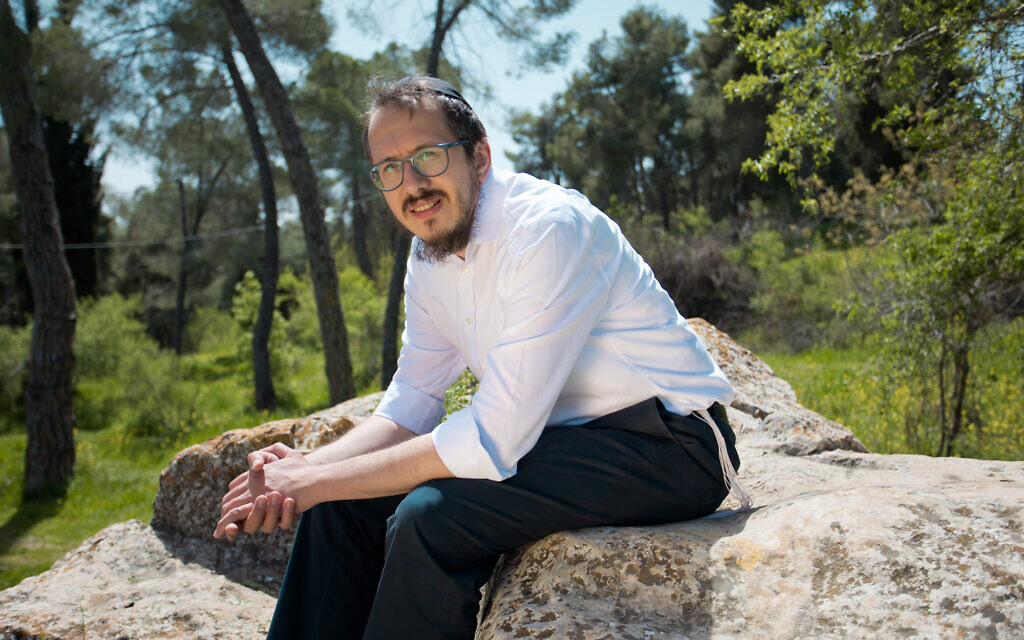
On the morning of February 24, 2022, Motl Gordon woke up to the news that Russia had invaded Ukraine.
“It dawned on me that it’s another epoch now,” Gordon told The Times of Israel in a recent interview in Jerusalem. Within two hours he, his wife, and their two kids had airline tickets, and within 10 hours they were on a plane to Warsaw.
Gordon had spent the last five years leading an independent Jewish community in Moscow, Sredi Svoih (Among Our Own). Just minutes after deciding to leave, Gordon went to the synagogue to lead a Torah lesson and morning prayers. He didn’t tell his congregants about his plans — it wasn’t clear to him yet that he would succeed in actually boarding the flight.
It wasn’t a simple journey in terms of official documents: The family was traveling through Warsaw and not all of them had visas, Israel hadn’t lifted coronavirus restrictions, and the children weren’t vaccinated. They applied for special permission to circumvent the restrictions and enter Israel, but as the war had started on a Thursday, the approval came too late to make it to Jerusalem before the Sabbath. They ended up staying in Warsaw until Saturday night, when they boarded a flight to Ben Gurion Airport. On Sunday morning they arrived in Israel.
“Sixty hours,” Gordon says, “in which I could think of nothing else but getting to Jerusalem.”
The decision to leave was not easy since Seredi Svoih had flourished under Gordon’s leadership. But it wasn’t made in a vacuum. As he tells it, Russian Jews had begun leaving before February 24.
The first sign of things to come, he says, were the elections for the Duma — Russia’s lower parliamentary house — in 2021, during which Gordon saw the pre-election repression as too harsh to be reversed.
“It felt like a purge,” he says.
So he told some of his congregants who were already outside Russia that he thought it was time to start something new and move elsewhere.
“I wanted to start thinking of a way of serving Russian-speaking Jews from outside Russia that wasn’t Moscow-centric. I wanted to start an initiative that would serve Russian-speaking Jews in whatever place they decided to live in the world,” Gordon says.
Gordon imagined a gradual process that would take at least a year. But on February 24, it was brought forward — not just for him, but for at least a dozen community members who had been thinking of leaving and for whom that day served as a catalyst.
“I felt that Jewish life in Russia as I knew it was coming to an end. I couldn’t give a [sermon] on Friday night about anything but the war. And as a public figure, making anti-war statements on Shabbat is not safe for me, and it’s also not safe for the community. But a rabbi has to tell his community the truth,” he says.
Once in Jerusalem, Gordon recorded a video to tell his congregants that he had left. He wanted to make a strong statement and declare the invasion of Ukraine evil. But his synagogue board said he could bring unnecessary attention to the community members who were still there. (For this reason, Gordon also requested that The Times of Israel not publish photos of his congregants.) Instead, he focused on the fact that he’d taken his family to Jerusalem, that he would do his work from here, and that he supported the members in whatever decisions they made. Ultimately, the statement was in the choice he’d already made and the fact that the video had been sent from Jerusalem.
From secular Soviet-style Jew to rabbi
Gordon grew up in a secular Jewish family in St. Petersburg. At the age of 5, he learned Yiddish singing and folk culture. His teacher, Larissa Pecherskaya, was one of the most sought-after teachers of Jewish tradition and Yiddish song in the city.
As a 12-year-old, he wanted his younger brother, then aged 5, to have the experience too. Pecherskaya had left for the United States, but one of her students had taken up her mantle, and Gordon enrolled his younger brother, accompanying him to the lessons.
“I thought I had already outgrown all of this,” he recalls with a smile. “But it was evident to me now that there was something so much bigger behind it.” So he started to study Yiddish in earnest.
By 16, Gordon was teaching Yiddish at a local Sunday school and had joined a klezmer band. At 19, he began working as an educator at the Jewish Community Center. He also took part in the Naomi Prawer Kadar International Yiddish Summer Program in Tel Aviv, first as a student and then as a teacher. It was during this period that he was pulled toward religious observance.
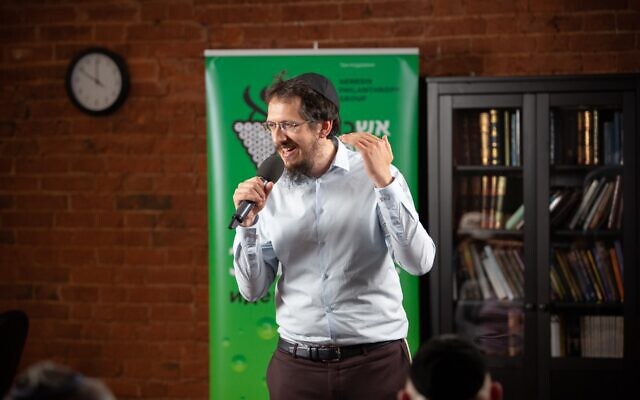
“I felt like I needed to connect the dots, like there was a gap in my education, in my identity. So I went to [the ulra-Orthodox Jerusalem neighborhood of] Meah Shearim on Shabbat,” Gordon says. “I met some people who spoke Yiddish. They invited me in and I felt the need to observe Shabbat from that point on. It’s not like I thought about crossing the bridge from the secular to the religious world. It just felt like something that matched quite well with my life and with my understanding of what’s important.”
He returned to St. Petersburg and began to attend synagogue every Shabbat, which led him to seek more religious education within the Chabad movement. He traveled to cities across Russia to lecture on Jewish life and culture, and to share different approaches to combining Judaism with the life of modern young people in Russia. During these years, he also traveled regularly to Jerusalem to study in a rabbinical seminary. Then, in 2017, he was invited to lead Sredi Svoih in Moscow.
“It was exciting to be hired by a synagogue — not a boss or a donor, but an entire community that hires and fires rabbis based on their performance,” Gordon says.
In Russia, he explains, being the rabbi of a community meant doing a lot of things: Raising funds, being a life coach, and teaching Torah classes — not in the traditional sense, but in a way that’s familiar and relevant to people. It also involved marketing, events management, and leading all prayers during Shabbat and holidays, including reading all Torah portions. And it gave Gordon opportunities that didn’t exist anywhere else.
Reaching people on their level
Gordon never rests for long. In Jerusalem, he rented a shared office space in the city center and began to prepare a new initiative, which included a Shabbaton, or weekend-long spiritual gathering, at the end of his second week in Israel.
The Shabbaton, which took place at the Cinema Hostel on Shamai Street, included congregants who’d left Russia as well as their friends, who had not been active in the community in Moscow, but who were now interested in spiritual support. The group cooked its own meals, went to the Western Wall at 7 a.m. for prayers, and conducted Torah classes meant to help process the real situation that included topics like war, responsibility, dictatorship, helplessness and guilt. And, as Gordon tells it, the Shabbaton ended with an impromptu happening that he experienced as a deeply affirming spiritual event.
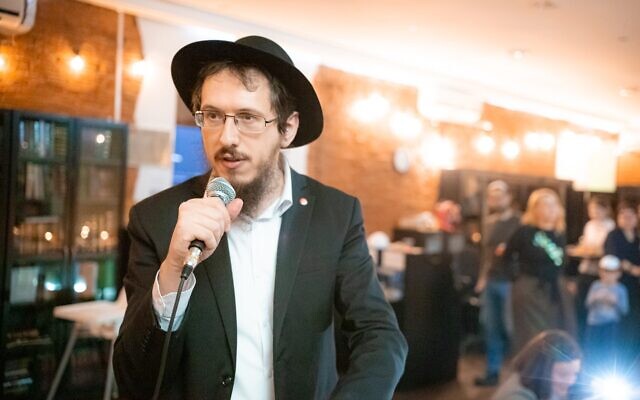
“Before Shabbat,” he says, “I told everyone that there was only one mitzvah this Shabbat: not to read news for 25 hours. And people accepted that. When it was almost time for [the] Havdalah [ceremony that signifies the conclusion of Shabbat], I realized that we had reached this heightened state, and that it would all be ruined as soon as they read the news. So I had to find a way not to ruin the mood and actually to do the opposite. To make fun of the news.”
Gordon and the group decided to read the news together out loud, like a radio play or cabaret, playing out the different politicians as characters. There was a pianist there who played piano. And, in the end, they just sang the news. For melodies they used old Soviet songs, especially from children’s animated films.
“The whole hostel filmed us,” Gordon says. “I had to go around and ask people not to put it on social media because it would put some of the participants in personal danger.”
For Gordon, the event was a pilot for the kind of spiritual, cultural and religious programming he plans to develop as part of his new initiative. It has already led to another of its kind: One of the participants, filmmaker Ruslan Sorokin, has become a leader of sorts for his own community of friends and colleagues from the film and television industry — people, says Gordon, who have come to Israel over the last month, of which there are dozens.
Sorokin organized a get-together in his apartment where people could relax, talk about their experiences, and put the situation in some perspective. He invited Gordon to come and speak to the group about the theme of artists and power, how prophets communicated with kings, and how Hasidic masters communicated with the Tsars. This is the kind of work that Gordon hopes to do in the near future — working with Russian Jews as they are, rather than trying to fit them into the mold of another culture.
“The idea is not to reframe things,” he says. “Not to sell them anything. Just to understand, on a deep level, who they are, what they are connected to, what cultural influences speak to them, what inspires them.”
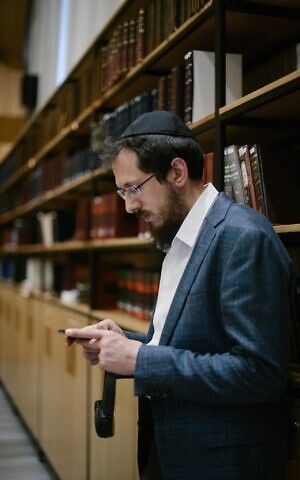
“What Ruslan did immediately connected in my mind with what I’d read and researched about synagogues in Eastern Europe which were organized by trade communities,” Gordon says. “The shoemaker’s shul, the baker’s shul, the tailor’s shul — you recognize its existence, its power, and what brought these specific people together. It’s not about working above these structures, but using these structures, their specific social fabric, to help people find their place, to connect to each other, to their heritage — to Jewish tradition and culture.”
This is especially true, Gordon points out, in times of crisis, when people need something deep to connect with. But his larger idea is that life is itself a crisis.
“The beginning is a crisis, the end is a crisis, at every turn there’s a crisis, and for each one there’s something in the Torah to help you get through this. You don’t need to be part of a particular political group or religious group to use this,” he says.
Gordon also says that much of his motivation comes from the drive to create an initiative that’s not just another Jewish organization with a top-down agenda or a quasi-sect revolving around a rabbi.
“Sure, you need a charismatic person to put it together, but it’s not just about me, it’s about creating a network that wouldn’t depend as much on a single figure as its leader,” he says.
The entire initiative was the result of a chain of events put into motion by a state structure that had too much concentrated power, says Gordon. For that reason, he’s building his vision on an evenly-distributed structure, run by those who benefit from the programs.
“I want people to feel like they make a difference,” Gordon says. “And we see this in what’s happening now in Ukraine, where a lot of people believe they can make a difference.”
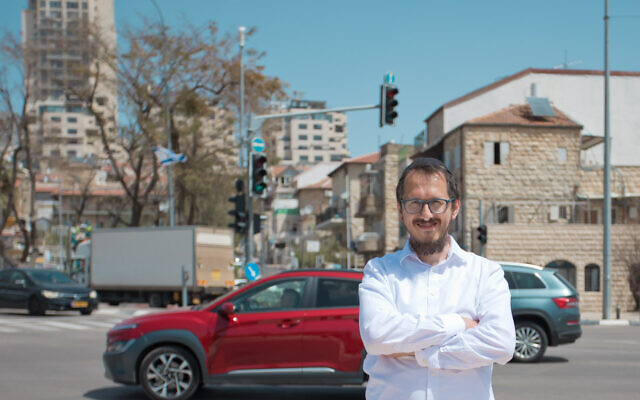
Gordon left Russia quickly, but his thoughts are directed squarely at the future.
“We are used to thinking of Russian-speaking Jewry as a thing of the past,” he says. “People immigrate, one generation goes by, and then they’re integrated into society. The same goes for Israel and for America and other countries.”
What’s important about the people leaving now, he explains, is that they have the resources to build their Jewish legacy not by overwriting their Russian-speaking identities, but by engaging with them. Since announcing his departure by video, Gordon has also informed his Russian community that a search is now ongoing for someone to lead them in Moscow as he begins to develop his global initiative.
“We bring a huge linguistic and cultural background… which is actually very much interconnected with Eastern European Jewish culture,” Gordon says. “We aren’t starting over and leaving behind all of the resources that we developed in the Russian sphere. We are using these resources for building our new identities, which can be crafted with this heritage in mind. It’s a respectful thing to do toward our grandparents. And it’s our way of creating a more sustainable continuity.”
As reported by The Times of Israel
